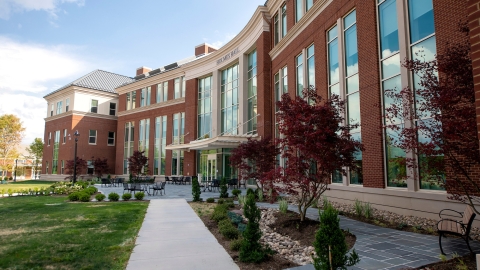
Holmes Hall Earns LEED Gold Certification for Its Planet-friendly Features
March 11, 2022
Holmes Hall is home to the Freeman College of Management. Photo by Emily Paine, Communications
Holmes Hall — Bucknell University's newest building and the home of the Freeman College of Management and Department of Art & Art History — has already become a transformative space for the scores of students who enter its labs, studios and classrooms.
But even as Holmes Hall makes a lasting impression on Bucknell students, the building itself has been designed to minimize its impact on planet Earth.
With a heating and cooling system whose energy-efficient features can be monitored in real time, a building design that enhances ventilation to naturally improve indoor air quality and bathrooms built to use dramatically less water, Bucknell's newest building stands as the latest symbol of sustainability on campus.
In recognition of the building's planet-friendly design, Holmes Hall received LEED Gold status from the U.S. Green Building Council.
"At Bucknell, sustainability is more than just something we talk about," says Jeff Loss, associate vice president for Facilities. "As one of the core pillars of our Strategic Plan, sustainability is central to our University's mission. That's why every new building is carefully designed to meet or exceed the stringent standards set by LEED."
LEED, an acronym for Leadership in Energy and Environmental Design, is a rating system used to measure a building's sustainability and resource efficiency.
Holmes Hall is Bucknell's seventh LEED Gold building, joining Academic East, MacDonald Commons and the four buildings that make up the South Campus Apartments. Another nine facilities on campus have achieved LEED Silver status in the Building Design and Construction category.
Three major renovation projects have received LEED accreditation (one with a Certified rating and two with a Silver rating), and Academic West earned a Platinum rating in the LEED Operations and Maintenance category.
At Holmes Hall, the planet-friendly features don't end when a student exits the building. Outside, rain gardens and bioswales improve stormwater runoff. And speaking of rain, the native plants in the landscaping can survive on Mother Nature alone — requiring no irrigation system.
The building's designers even considered ways to reduce light pollution, including exterior LED lighting that's cast downward.
Holmes Hall, like the rest of campus, is primarily designed for pedestrians. The building itself is conveniently located near residence halls, dining facilities and other places students frequent.
Once students arrive at Holmes Hall, they'll find a pedestrian-oriented open space consisting of paved plazas, walkways, an open lawn, new and mature trees, tiered rain gardens and attractive entry landscaping. In addition to earning points toward LEED certification, these exterior features make Holmes Hall a place where students will want to spend time.
Acknowledging that some visitors will use other means of transportation to get to Holmes Hall, designers encouraged bicycle use by adding both short- and long-term bicycle racks.
And for those who must drive, the nearby parking lot includes electric vehicle charging stations and priority spaces for low-emission vehicles.
"Taken individually, each of these green features is another step toward a more sustainable future," Loss says. "But when you take the sum of these individual parts — and add in students and faculty who genuinely care about this mission — the result is an innovative space for students to learn and grow while minimizing their environmental footprint."

